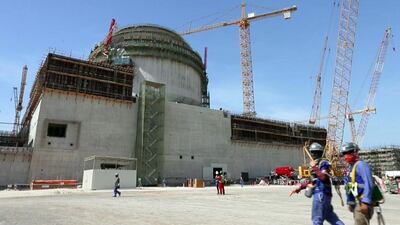The UAE government is exploring options to fund its US$20 billion nuclear reactors and to store nuclear waste as the emirate of Abu Dhabi gears up to pour concrete next year on its fourth plant, a government official said on Monday.
The UAE, the first country in the Arabian Gulf to build nuclear reactors, is building four units in an area west of the capital to generate 25 per cent of its power from nuclear energy by 2020.
The project had been fully funded by the Government, with various finance options being considered for future work, said Fahad Al Qahtani, the group external affairs director at Emirates Nuclear Energy Corporation (Enec), the company building the reactors.
The UAE is looking to diversify its energy mix to lower dependence on fossil fuels. It is embracing renewable energy in addition to nuclear to achieve its target and meet power demand that is expanding by about 9 per cent a year.
In 2009, the UAE awarded the state-run Korea Electric Power Corporation (Kepco) the $20bn construction contract to build the four nuclear units by 2020.
In 2012, Enec signed a $3bn fuel contract with six companies to source uranium for 15 years, starting in 2017. Uranium will not be enriched to a level exceeding 5 per cent, said Mr Al Qahtani.
Companies that may provide the uranium include France’s Areva, Russia’s Tenex, Canada’s Uranium One, the United Kingdom’s Urenco and ConverDyn of the United States.
“They, either independently or working together, will work on what we call sourcing the enriched uranium product,” Mr Al Qahtani said. “They will mine the uranium, convert it, enrich it then package it and then send it to Kepco, who will eventually package it in their assemblies and bring it to here.”
The UAE is currently exploring options to store nuclear waste and is looking at three scenarios. The first short-term option is using spent fuel pools, the second medium-term option is dry casks above ground at the site of the reactor, and the third option is having underground repositories.
Fuel leasing may also be considered, where spent fuel is recovered by a leasing company after being removed from the reactor core.
Short-term fuel storage lasts 20 years and mid-term fuel storage lasts up to 100 years, Mr Al Qahtani said.
“The spent fuel quantity is so small,” he said. “The short-term and mid-term will suffice for use for a long time.”
Enec has already started pouring concrete for its third unit after receiving approval in September from the Federal Authority for Nuclear Regulation (FANR).
The first unit is slated for operation by 2017 and unit two is due to enter commercial operation in 2018.
Unit 1 one was 61 per cent complete and unit 2 two was 37 per cent complete, Mr Al Qahtani said added.
The UAE currently had no plans to further expand its nuclear programme, but may look at this option in the future, he said.
“In the future if the government decides there is more demand, the company is of course ready, but for the time being we are focused on developing the four units,” he said.
“One of the things we did when we looked at the site is we looked at a site which is big enough for expansion if it ever happens.”
dalsaadi@thenational.ae
Follow The National's Business section on Twitter

